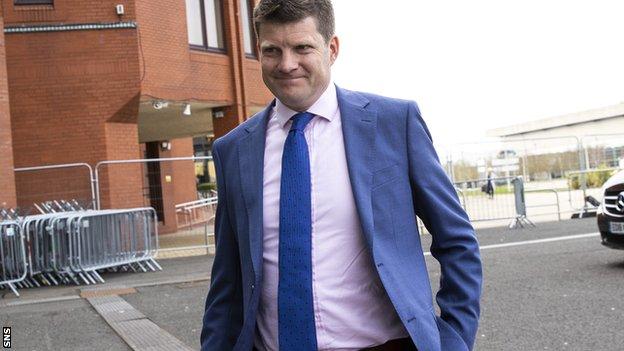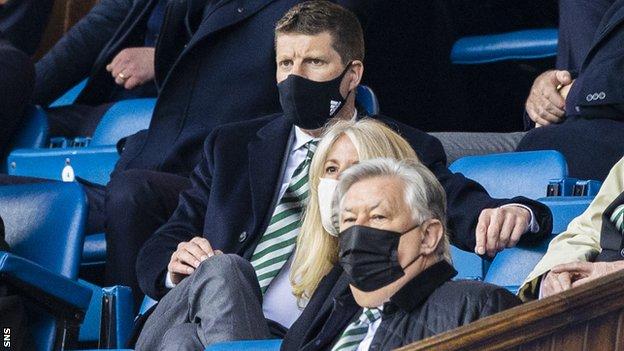Celtic: 'Curious McKay exit undermines supposed brave new world'

Last updated on .From the section Celtic

Dominic McKay's arrival as Celtic chief executive saw him facing the full gamut of modern-day media - television journalists, radio reporters, newspaper writers, bloggers, vloggers and podcasters.
McKay talked for Scotland that day, a non-stop mantra about how, in the coming months and years, he was going to "modernise", "evolve" and "develop" the club for the fans of the present and the future.
His departure, just over two months later, was somewhat more subdued. A statement on Friday caught everybody on the hop. Twenty-three words from Ian Bankier, the club chairman. Twenty-three words from the now former chief executive. Forty-six words in total. In what was a blink-and-you'll-miss-it reign, the abrupt goodbye was fitting in a sense. Already it almost feels like McKay was never really there.
- McKay quits as Celtic chief executive
- Celtic persevere to see off County
- Celtic's Kyogo out for up to a month
The valedictory statement mentioned that McKay was leaving for personal reasons. It went on to express good wishes to him "and his family". The way it was worded was unfortunate for it allowed the opinion to be formed that something upsetting had befallen him in his life.
Certainly, in the offices of his former employer, Scottish Rugby, there was concern. McKay is well thought of at Murrayfield and in the information vacuum there was chat about what was going on in his world. Nobody knew. Inevitably, the personal reasons explanation and the mention of his family sparked speculation in cyber land. Nobody had a clue what was going on, so the theories emerged.
The following day brought stories in a few newspapers. The message relayed was that McKay wasn't working out, that he was a bit out of his depth and that he jumped from his position before he was pushed. That 'jumped before he was pushed' expression appeared in several places. It wasn't a figment of a journalist's imagination and it didn't drop out of the sky.
Many calls were placed to McKay in order to find out his side of the story but he's not been minded to give it.

One of the many curious things about all this is that Celtic had known all about McKay for many years. Himself and Peter Lawwell got to know each other well. They worked on a few things together. McKay has regularly spoken about his love of the club.
As an executive team at Celtic Park, they had ample opportunity to size him up and assess him as a potential successor to Lawwell. If you buy the view that the job was too big for him, then surely you have to ask about the judgment of those who put him there.
That's if you buy that version of events. Until McKay speaks then the story is incomplete. There are two sides to every tale.
'Hubbub can't help Postecoglou'
The fans appreciated McKay's openness and accessibility. He promised more fan engagement and in his brief time he lived up to that promise. Some - many - Celtic fans complained last season that their voices weren't being listened to, that their board was taking them for granted and that serious disquiet existed. A clear disconnect had opened up. You could read about it, listen to it and, at times, see it up close outside Celtic Park. At times, it was pretty unpleasant.
In the media and fans events he spoke at, McKay talked regularly about the need to modernise the club. In one aspect he was getting there for sure. The appointment of an impressive new manager, Ange Postecoglou, and a dozen new signings (slow in coming but they are there now) showed that the on-pitch part of the rebuild was coming along. His thoughts on developing the business side were never given a proper airing. He was gone before he could make any difference on that front.
This is where Celtic has found itself now. An acting chief executive and still no sporting director and no indication of whether they still want a sporting director. No head of recruitment either, and no indication of whether they are intending to appoint anybody any time soon.
Dermot Desmond remains the largest shareholder, Lawwell remains a director, Michael Nicholson, at the club since 2013, is still a key man with a new remit of interim CEO. Gordon Strachan, the former manager, is on the scene, too. His three-month consultancy is on-going.
There's a different manager, but the backroom coaching staff is the same as it was before. Maybe they don't need it, but it's not exactly a mass changing of the guard. It's more akin to back to the future than a brave new world.
In all of this, you think of Postecoglou. He comes across as a strong man who just cracks on with stuff, but this latest hubbub can't be a help to him. After just over 70 days the chief executive who eulogised him at every turn has gone. Who does he actually report to now? Nicholson, Lawwell, Desmond, Bankier? Who's making the important day-to-day decisions?
The Celtic board will be hoping for a string of victories, not just to put the club into a good spot in the Premiership and Europa League, but also to quieten any gathering anger among the support. It's not that they thought McKay was a revolutionary genius, but at least he listened to them. They might be asking, 'Who's listening now?'
Wins will hold off severe critical analysis of the McKay business. Defeats will only bring it to the fore. That brings us back to Postecoglou - the kind of cool operator the club needs in these peculiar times.

- "It can become an uncomfortable place": Why are so many girls dropping out of sport in their teenage years?
- Sebastian Vettel on allyship: Listen now as the Formula 1 star talks about the importance of visibility
